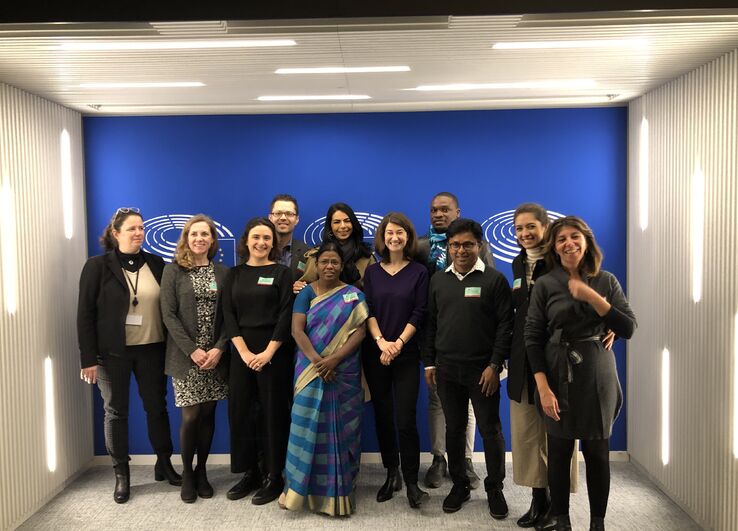Over the past years, Anti-Slavery International, along with allies from the EU and around the world, has been advocating for the EU to introduce two laws to tackle forced labour. Today, we are delighted to share that the EU has progressed both the Forced Labour Regulation and the Corporate Sustainability Due Diligence Directive (CSDDD). These laws will work together to tackle forced labour in supply chains and will have untold impact on workers all around the world.
Our partners and the workers they represent around the world share what The CSDDD means to them.
Everyone deserves to live and work in freedom, but we know that there are over 21 million people in forced labour all around the world, producing the products and providing the services we use every day. While recent global progress in tackling modern slavery has not been anywhere near ambitious enough to truly see an end to slavery, this week marked an an important milestone towards eradicating forced labour.
What is the Forced Labour Regulation?
The Forced Labour Regulation is designed to prevent perpetrators from profiting from forced labour and also to provide consumers with positive assurances about the products they buy. If implemented well, the Forced Labour Regulation can positively impact workers in EU supply chains. The Forced Labour Regulation will mean the EU joins the United States in agreeing to a strict product control measure to prevent goods made with forced labour from being traded on its market.
Over the past years, we have worked extensively behind the scenes to try and make sure that the draft text for the Forced Labour Regulation would be as worker-centric as possible. In late 2022, we worked alongside allies at the European Center for Constitutional Human Rights and the Greens/European Free Alliance Group to publish a “model law”. While not all of our recommendations were included in the final and agreed on Regulation, we will continue to work alongside EU policymakers to make sure that this law is implemented in the best way possible.

NForce colleagues at the EU Parliament with MEP Lara Wolters.
What is the CSDDD?
The Corporate Sustainability Due Diligence Directive is designed to work alongside the Forced Labour Regulation and compels companies to conduct effective human rights and environmental due diligence. This law will mean that businesses have to conduct due diligence throughout most of their value chain – from raw materials through to the transport of their final products. Under this law, companies will have to carry out “meaningful engagement” with stakeholders, including workers and their representatives, and they will have to provide remedy to workers for harm they have caused. This law will also compel companies to go beyond just social audits and will also include consideration of a company’s purchasing practices.
While we are very happy to see that the CSDDD has progressed and will soon become law, it’s really important to mention how devastating the final few months of campaigning for this law have been. EU policymakers had agreed on the core text in 2023, and the law was on track to pass. However, Germany, Italy, and subsequently, France made catastrophic last-minute attempts to sabotage and then water down the law. We, alongside other campaigners, business advocates and politicians, responded with tireless energy and managed to save the law – albeit in a weaker form. This law will still have a tremendous impact on workers all around the world, but it’s nowhere near as strong as it could – and should – have been.

Shakirul Islam, Ovibashi Karmi Unnayan Program
What do these EU laws mean for workers?
We are proud to be part of the Global Network Against Forced Labour, a collection of organisations who represent workers around the world. We, alongside our colleagues in the Network have been advocating to EU policymakers to make sure that workers interests are adequately represented in these laws. We wanted to share our colleagues’ perspectives directly.
Shakirul Islam, Ovibashi Karmi Unnayan Program:
“After years of advocating for CSDDD we are pleased with the vote today. This law could have a tremendous impact on migrant workers in supply chains around the world. We are particularly pleased with the requirement for businesses to meaningfully engage with workers in various stages of their due diligence process. This type of mandatory engagement is essential to ensuring worker harm is reduced.”
Zumretay Arkin, Director of Global Advocacy at World Uyghur Congress said, “The parliament’s vote is a positive one and will require companies to address forced labour in their supply chains. Unfortunately, the EU has missed a crucial opportunity to agree on an instrument that could meaningfully address forced labour when the government is the perpetrator, like in the Uyghur Region in China. We welcome this milestone but stress that all related guidance, guidelines, and considerations of when to investigate cases be created in a way that ensures the regulation can effectively ban products made with state-imposed forced labour.”
What do these laws mean for non-EU countries ?
These laws will have a tremendous impact on countries all around the world, as they will now have to provide assurances that products being exported to the EU have not been made with forced labour. We hope that this will have a positive knock-on effect that will encourage other countries to introduce similar laws. The Forced Labour Regulation, in particular, is extremely important for the UK, which has fallen behind in introducing sufficient anti-forced labour laws. With both the EU and US having strong product control laws in place, the UK is at extreme risk of becoming a dumping ground for goods made with forced labour.
What happens next for the Forced Labour Regulation and the CSDDD?
Once these laws are in force, there will be guidance for businesses, secondary legislation and Member State enforcement. Anti-Slavery International will continue to provide our expertise to ensure these laws are effectively implemented and enforced. However, these laws are not yet in force. Once the texts are translated and given final approval (expected later this year), there will be a couple of years before they come into force. This gives companies sufficient time to embed the processes and frameworks required to ensure they aren’t reliant on forced labour. It’s best that companies start to consider what risks exist for them as soon as possible to ensure they effectively identify, remedy, and prevent forced labour. Anti-Slavery International has been providing advice to business partners for years on how to embed effective policies and processes. To understand what these laws mean for your business, see here.